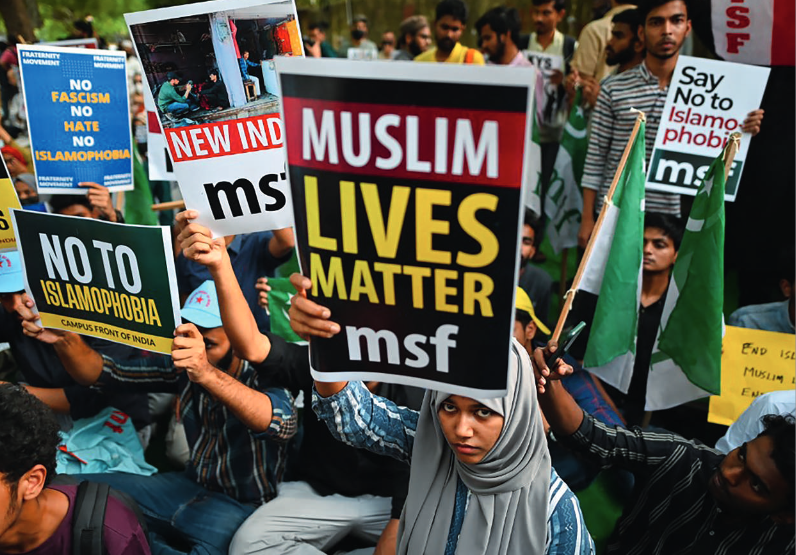India's AI-driven anti-Muslim disinformation network spans the globe


Protestors hold placards during a demonstration against anti-Muslim violence and hate crimes in New Delhi on April 16, 2022. (AFP)
ISLAMABAD: Artificial intelligence (AI) has become the latest weapon in a years-long disinformation campaign targeting Muslims in India and Pakistan internationally, with AI-generated images now spreading hatred globally at unprecedented speed and scale across social media platforms.
A September 2025 report by the Washington-based nonprofit Center for the Study of Organized Hate documented how 297 accounts created 1,326 AI-generated images and videos between May 2023 and May 2025 that dehumanized India's approximately 200 million Muslims. The posts accumulated 27.3 million total engagements across X, Facebook, and Instagram, with activity surging after January 2024 as AI tools became more accessible.
The AI-generated content follows four patterns: sexualizing Muslim women, portraying Muslims as subhuman, promoting conspiracy theories, and glorifying violence. Images depict Muslims as snakes wearing skullcaps, show fabricated scenes of Muslims celebrating terror attacks, and create pornographic content featuring Muslim women without consent.
"This represents the acceleration of hate speech practices through content with greater credibility and precision at scale," the report said.
The synthetic images reinforce long-standing conspiracy theories. "Love Jihad" falsely claims that Muslim men systematically seduce Hindu women for forced conversion. "Rail Jihad" baselessly attributes train accidents to Muslim sabotage. Following a January 2025 train accident in Jalgaon that killed 11 people, caused by passengers fleeing what they thought was a fire, Hindu nationalist outlet Sudarshan News circulated AI-generated images showing a Muslim man holding an axe near a train as supposed proof of a deliberate attack.
The report stated how Hindu nationalist media outlets OpIndia, Sudarshan News, and Panchjanya have emerged as primary producers and amplifiers of AI-generated hate. OpIndia's network alone produced 262 posts generating 1.1 million engagements. When researchers reported 187 posts for violating platform guidelines, only one was removed.
The AI-driven hate campaign is built on infrastructure exposed years earlier. In December 2020, Brussels-based EU DisinfoLab revealed a network of over 750 fake local media outlets operating in 116 countries, as well as more than 10 sham NGOs accredited to the UN Human Rights Council.
The operation, primarily targeting Pakistan, resurrected defunct NGOs, impersonated European Union institutions, and used a deceased international law professor's identity to manufacture credibility. Asian News International, an Indian news agency, amplified content from these fake outlets globally, according to the report.
More recently, a temporary location feature on X revealed several accounts claiming to be Israeli or Zionist were actually operating from India, showing a coordinated identity deception across the network.
The tactics parallel those of Western far-right movements. After the 2024 Southport stabbings in Britain, AI-generated images spread Islamophobic claims about the attacker's identity.
In Italy, opposition parties filed complaints against Deputy Prime Minister Matteo Salvini's League party for distributing AI-generated images depicting men of color assaulting women.
The Center for the Study of Organized Hate describes this as "slopaganda": deliberate use of cheap, abundant synthetic content to seed hate across digital spaces.
In India, the consequences extend beyond digital harassment. Following the April 2025 Pahalgam attack in Indian-occupied Kashmir, civil rights groups documented 184 anti-Muslim and anti-Kashmiri hate crimes between April 22 and May 8.
A February 2025 Center for the Study of Organized Hate report found that of 1,165 hate speech events recorded in 2024, 995 were first shared or livestreamed on social media platforms.
The spike in AI-generated content coincides with rising religious tensions. A 2019 Indian Supreme Court verdict awarded the disputed Ayodhya site (formerly the 16th-century Babri Mosque, later demolished) to Hindus for temple construction.
The 1992 Babri Mosque destruction sparked riots that killed thousands, mainly Muslims. AI-generated images now depict that demolition in romanticized animation styles.
Hindu nationalist groups claim numerous historical mosques were originally Hindu temples, including promoting a debunked theory that the Taj Mahal was a Hindu temple named "Tejo Mahalaya."
In 2021, Meta whistleblower Frances Haugen revealed that the company knew users in India were being flooded with hateful propaganda against Muslims, fueling violence. Platform failures to moderate AI-generated hate content persist as synthetic media proliferates faster than enforcement mechanisms adapt.
With low-cost ChatGPT subscriptions now available in India for less than $5 a month, the report warns that conditions exist for exponential growth in AI-generated hateful material threatening religious minorities with psychological harm and physical violence.
Latest News
Gaza civil defence says Israeli strikes kill at least 5
AN HOUR AGO

Civilian death toll in Sudan war more than doubled in 2025, UN says
4 HOURS AGO
.jpg)
Paramount poised to acquire Warner Bros. after Netflix walks away
4 HOURS AGO
.jpg)
Pakistan retaliates befittingly after unprovoked Afghan aggression: information minister
5 HOURS AGO

Iran says 'good progress' in US talks, next round within a week
8 HOURS AGO
.jpg)